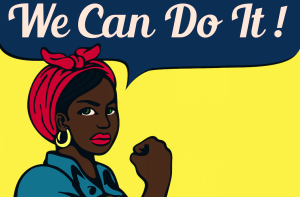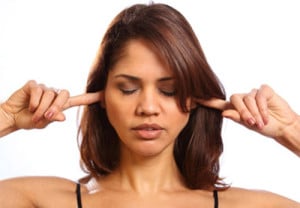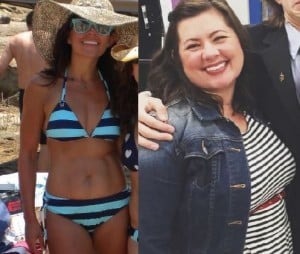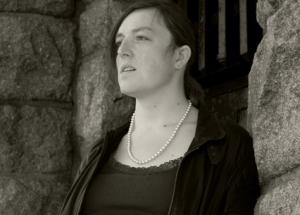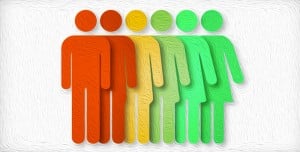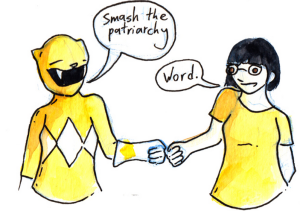As a young Black woman longing to be a part of a movement for justice, I had a strong sense that the feminist community could help me meet that need.
All my life, people treated me like I was born to be less capable than cis boys, and when I found feminism, I thought I’d found a space to grow into a woman who got just as much respect as men.
But at the time I knew very little about feminism, and even less about the many ways to practice it. I could have really used some help figuring out where to start and the best ways to fit it in my life.
And while I eventually found my way, it was not without some surprisingly racist microaggressions to navigate through first.
For example: There was the first feminist literature I read – all by and about white women.
Professors in my earliest women’s studies classes in college presented these books as if they were the most important – or only – texts on feminism, in spite of the abundance of literature written by Black feminists since before I was born.
There were the first feminist groups I joined – all with primarily white women in leadership and attendance.
There was the history I learned about white feminists’ pattern of putting Black women on the back burner.
And there were the many, many, many different instances when I was reminded that the feminist movement’s problem with race isn’t just a part of the past.
Consider the recent examples of high-profile celebrities like Madonna and Patricia Arquette calling for people of color to get on board with “women’s issues” – as if we don’t still have our own issues to fight, and (even more audacious) as if some people of color aren’t also women.
And this is not new! It’s something Black women have been fighting against since the beginning of the women’s suffrage movement.
For example, Sojourner Truth and Ida B. Wells are just two of our many powerful foremothers who stood up to white women’s attempts to exclude Black women from the pursuit of gender equality. Why aren’t we discussing them in our women’s studies courses?
And where do you fit into the focus on a middle class ideal of “having it all” with career and family, when Black women have already been holding down those roles for a long time – and many of us without the added bonus of being middle class?
If you’re a Black person just beginning to learn about or identify with the movement, you may feel isolated within feminism. You may struggle to find a place for yourself in the movement. You may wonder why you should bother with it at all.
But here’s the thing: you deserve to find a feminist practice that speaks to your unique needs and honors the special gifts you have to offer.
That works together with, not in opposition to, your ways of resisting racism. That affirms your beauty when even body positivity movements make you feel invisible. That will not erase the vital contributions you make to tearing down oppression.
And regardless of what you may have learned from mainstream feminism, the gender studies books you’ve read, or the upper middle class, white, able-bodied teachers you’ve had, there are so many different ways to practice feminism.
There is a way for you to find that social justice practice you deserve.
Here are five choices that could help you find your way, and how they look from where I’m standing now.
Option #1: Try on Mainstream Feminism (Which Might Come at the Expense of Your Blackness)
This option crossed my mind as a young feminist, before I knew there was anything else.
Mainstream feminism spoke directly about women’s struggles in a way I’d never heard before. Being part of that movement means connecting with a huge culture of studies and activism on everything from street harassment to rape culture to gender roles.
My introduction to mainstream feminism gave me lot of my ability to talk with other people about these issues, instead of feeling confused and silenced.
However, there are certain drawbacks of being a Black feminist trying to fit into mainstream feminism.
Con: It’s unhealthy to internalize the anti-Black racism that says you can have justice only if you assimilate to whiteness.
But that’s the message many of us are told by mainstream feminism. During my stint, I felt like there was an expectation to check my Blackness at the door, which is just not possible for me.
In this form of feminism, so-called equality looks like feminists saying, “I don’t see color,” offering the erasure of our Blackness as a compliment or affirmation.
So-called justice looks like feminists calling for more of the law enforcement culture that threatens Black lives.
And fighting rape culture often means villainizing Black men and adding to the criminal “justice” system that destroys communities of color, all in the name of “women’s safety.”
Con: You might be pressured to give up Beyoncé, or whoever stands for Black woman power to you.
I know – say it ain’t so. Lots of mainstream feminists debate who we’re supposed to be applauding or booing as symbols of the rise or downfall of feminism – and many of them refuse to include several Black pop culture figures under the banner of “proper” feminism.
So when the white feminists around you talk about childhood feminist icons, you’ll wonder who the hell Topanga is. (Just kidding. White folks don’t own Boy Meets World; I love that shit. And can I get a hell yeah for Angela?).
Are there advantages for us if we choose mainstream feminism? Not many, from my perspective.
Pro: White-dominated feminist organizations do get a lot more funding than those led by people of color.
The cool part of this is that you could build up your collection of bumper stickers, if you’re into those.
In all seriousness, I can understand why some people of color would consider this option when they’re trying to figure out how to create the change they seek.
The good news is this isn’t the only way.
It is possible – and necessary – for you to thrive and fight for justice in the fullness of all that you are.
So if you find yourself among self-identified feminists who expect you to leave the beauty of your Blackness out of the picture, consider that you’re worth a movement that values all of you.
Option #2: Don’t Be a Feminist (Possibly Saving You from Some Racism-Flavored Heartache)
Some feminists believe in an unwritten code that says, “If you believe in gender equality, you’re a feminist” – whether you feel like one or not. I’m about to break that code.
You don’t have to identify as a feminist if you don’t feel like it’s for you. Many people don’t. And many people have valid reasons not to.
I can’t say I blame the Black folks who don’t identify with the feminist movement. Mainstream images of feminism rarely include us, and at their worst, some go so far as to actually harm us.
Here’s the plus side of deciding feminism’s not for you:
Pro: You don’t have to question sharing an identity with people who don’t prioritize people of color or who say blatantly anti-Black things.
I mean, what can I say when a white woman from Southern California identifies as a feminist and goes to Kenya to become a Masai warrior, in order to “prove” that women can?
There are people who don’t see a problem with that, and some of those people identify with a movement I hold dear to my heart. These Feminists (TM) exhaust me, and if you’re not a feminist, you can save on the self-care expenses they cost me.
Pro: You don’t have to be a feminist to practice social justice and gender justice.
As people in communities of color have demonstrated for years, a person doesn’t need to call themselves a feminist to contribute to a just world.
We probably all know someone – a grandmother, a brother, a mother – who embodies anti-oppressive feminist values, but who doesn’t say they’re a feminist.
I know people who express their commitment to justice through art, through parenting, and through social justice organizing, too – but not under the banner of feminism. They’re helping create a better world in all the ways they survive.
As one person said in the “Black Folk Don’t” feminism episode, “all the women in my family are feminists because they’re still here.”
Pro: You don’t have to give up Beyoncé for Lorde. In fact, you can love or loathe either!
If you don’t identify with the movement, you won’t feel the pressure of having people around you disapprove of your guilty pleasures.
Hey, I’d think twice about identifying with a movement that calls for me to automatically sacrifice my problematic faves!
And the downside of rejecting feminism?
Con: It’s empowering to be connected to others within a movement.
Even when feminism felt like an imperfect word for me, I was grateful for many of the people the word brought in my life. People who could understand the frustration of being objectified, underestimated, and dehumanized on a regular basis. People who validated my feelings and helped me find the words for my exasperation.
If nothing else, “I’m a feminist” can be shorthand for “I won’t stand for sexism,” so without that identity, you could have a harder time finding a community with like-minded values.
Con: Feminism includes a platform of phenomenal Black women who can inspire you.
Reading the works of powerful self-identified feminist thinkers like Angela Davis and Patricia Hill Collins has set me free from so many harmful cages of thinking about what it means to be a Black woman.
But you won’t necessarily miss out on this if you’re not a feminist. The important thing is for you to be grounded in something that lets you set your own path and make your own choices, and fight for the change required to do so.
Feminist or not, you deserve to be free.
Option #3: Practice Womanism (Which Was Custom-Made Just for Us)
This choice could be your answer to the drawbacks of the first two options.
Womanism is an anti-oppression ideology you could ground in, but without having to deal with white feminists dominating conversations and attempting to erase your Blackness.
In fact, addressing Black women’s needs is what womanism is all about. It’s for us, by us (but please don’t tell Alice Walker I implied it’s the FUBU of anti-oppression practices).
Walker coined the term womanism in 1983, to honor Black women’s legacy of addressing all forms of injustice, including racism and classism.
The upside of womanism is clear.
Pro: You get to do you, boo!
By which I mean, you know those gorgeous ways you’ve cultivated a unique sense of resilience, self-love, and community pride through your Black identity?
Womanism is a chance to celebrate and grow in that legacy of brilliance.
Every challenge and triumph you’ve pushed through as a Black woman can inform your path to justice.
Pro: You can define for yourself how your womanism relates to feminism, depending on what (if anything) you get out of each.
Identifying with only womanism works for some people, like Renee Martin, who writes in “I’m not a feminist (and there is no but),” “For some women, avoiding the label of feminist comes from a place of self-love and balance.”
For others, like Everyday Feminism’s own Jenika McCrayer, being both a womanist and a feminist feels right.
McCrayer writes, “My feminism is black, intersectional, and womanist. These identities are so intertwined in each other that they cannot exist on their own.”
So what about the drawbacks?
Con: I don’t see many cons to being a womanist.
If you’re at all worried about feeling isolated from other feminists, including non-Black feminists of color, keep Alice Walker’s analogy in mind.
“Womanist is to feminist as purple is to lavender,” she wrote.
You can be a womanist with room for, and solidarity with, other ideologies that align with your pursuit of justice.
Option #4: Practice Intersectional Feminism (Because We Are the Sum of Our Parts – Not Just Different Privileged and Oppressed Identities)
Feminism can’t be all bad, or no self-loving Black person would come near it.
Thanks to the hard work of marginalized leaders with a broader vision for justice, intersectional feminism is an option for more people, not just able-bodied middle-class white women, to participate in the movement.
Kimberle Crenshaw coined the term “intersectionality” in 1989, to recognize that multiple forms of oppression affect our lives.
Intersectional feminism comes with a lot of perks.
Pro: You can help center inclusive feminism as the image of the movement.
Because it resonates with so many people, intersectional feminism is gaining more ground even in mainstream feminism. And people are recognizing why feminism must be more inclusive to make a difference.
It’s like what Flavia Dzodan said: “My feminism will be intersectional or it will be bullshit.”
So instead of losing this influential movement to those who define it too narrowly to fit you, you can help spread the word that this is what feminism looks like.
With Black women’s needs not as some secondary thought, but at the very center of feminist goals.
Pro: You can fight more than just the patriarchy.
Intersectional feminism is about even more than inclusivity.
It’s also about addressing the whole reality of oppression. Because sexism doesn’t just exist on its own, separate from the other ways people are marginalized.
It relies on a hierarchical way of thinking that says that some people – people with race, class, or gender privilege, for example – are more valuable than others.
This system is called kyriarchy – multiple forms of oppression working together to keep each other in place.
With intersectional feminism, you can actually get to the root causes of all forms of oppression, using the strength of feminist activism to change the conditions that let oppression exist in the first place.
Pro: You get to grow with a movement committed to getting better and better.
Intersectional feminism isn’t perfect, because it’s led by humans, and no human can avoid all mistakes.
So, for our intersectional feminism to work, we have to grow – and we do.
We learn more each day about how to advocate for ourselves, work in solidarity with other groups, and shift our own words and ideas to include others.
Some feminists are pushing back, even saying that feminism has gone “too far” in including racial injustice, transmisogyny and more – at Everyday Feminism, we’ve been personally accused of talking about race and other issues “too much.”
But that’s a good sign.
Because even though the people who resist intersectionality are still around, their reactions to its growing presence show that things are surely changing – and that’s something to celebrate.
But speaking of mistakes, there can be some drawbacks to intersectional feminism.
Con: The moments when intersectional feminism is imperfect can be really hard.
You know how it goes when something becomes more mainstream: the visibility’s great, but many people are still learning about what it really means.
And they can make harmful mistakes – even if they mean well.
Ironically, some white feminists even try to use intersectional feminism to silence Black women. They argue that it calls for us all to “be in this together” – meaning we should stop expressing our anger over racial injustice so that our white “allies” can feel more comfortable.
So identifying as an intersectional feminist doesn’t necessarily mean you’ll be free from the struggle of anti-Blackness.
Con: Intersectional analysis can be really hard.
I can’t lie: Being an intersectional feminist is a lot of work.
Maybe you picked up on that when my explanation for it included every form of oppression – including the ones where you’re on the side of privilege.
When you’re looking at oppression through an intersectional lens, things can get complicated. There’s a lot to think about, including some uncomfortable truths, and sometimes, it can get overwhelming.
But if intersectional feminism feels right to you, it’s so worth it.
You can grow at the best pace for you, get tools for healing and accountability, and find opportunities to create change in your everyday life.
Option #5: Practice a Feminism Most Meaningful to You
After spilling all this tea on feminism, you may be wondering why in Audre Lorde’s name I still choose to be a feminist.
Well, I wouldn’t be if not for one valuable lesson: that I don’t need to be tied to anyone else’s rules or platform to practice what feminism means to me.
Mainstream feminism may not meet my needs, but feminism does not belong to white women. So I won’t let anyone tell me my Blackness means feminism isn’t for me.
You can decide what works for you. Here are some tips to help you think it through:
1. Prioritize Reading and Learning from the Work of Historical and Contemporary Black Feminist, Womanist, and Thought Leaders
While mainstream feminists cite leaders like Gloria Steinem as the pillars of feminism, Steinem herself is giving it up for the Black women who “invented” feminism.
Read works by and about those Black women who shaped the movement, like Angela Davis, Dorothy Pitman Hughes, and Alice Walker.
And of those feminists of color who have fiercely fought against the white, middle-class perspectives trying to co-opt the movement, like Kimberle Crenshaw and bell hooks.
I also recommend following websites like Crunk Feminist Collective, For Harriet, and Black Girl Dangerous, as well as the influential leaders of Black Twitter – when hashtags like Mikki Kendall’s #solidarityisforwhitewomen come along, you’ll be glad you did.
2. Read Work By Non-Black Feminist Thinkers as Well
Though I wished I’d read had more diversity in my earliest days with feminist literature, many of the books were worth reading for the foundational principles and history of feminism. Women like Simone de Beauvoir and and Betty Freidan can provide some of that foundation.
White feminists’ works may be considered by some to be pillars of feminism, but you can read knowing that they don’t entirely have your perspective as a Black person in mind.
And the moment they get anti-Black or exclusive, you can put them down, or reflect on why that isn’t your feminism – because it doesn’t have to be.
Take in some wisdom from non-Black feminists of color as well – like Aurora Levins Morales, Yuri Kochiyama, and Gloria Anzaldúa.
3. Decide What You Want from the Movement and Connect with Others Who Share That Vision
“My feminism” is a term I use frequently. I believe that multiple feminisms can and do co-exist, just as Trudy Hamilton of Gradient Lair describes when she says that “feminism will never be a one size fit all.”
Each of us can practice a feminism that honors our unique needs by spending time with people, in organizations, and on campaigns that support those needs.
My feminism creates room for me to express myself as a queer Black woman, without apology. It’s a platform from which I can help create the world I want to live in, free of white supremacy, ableism, transphobia, and other systems making marginalized people struggle for survival.
Sometimes I call this Black feminism, sometimes intersectional feminism, sometimes a form of womanism, and sometimes, I just call it life – I don’t always need a label to define my call for justice.
Regardless of what I call my practice, I’m grounded in my vision of and connection to my feminism.
***
The most important part of crafting your own feminist practice comes down to the fact that it’s yours. You don’t have to feel ashamed or change who you are if you stumble into a path that’s unhelpful or harmful to you.
I’ve gone through all of the above options, and in the end, I believe my feminism is like nobody else’s. It includes liberation, love, dance, poetry, respect for animals, a queer point of view, and rage against multiple forms of injustice.
What does your feminism include? You deserve a movement that honors all of who you are.
You don’t have to settle for anything less.
[do_widget id=’text-101′]
Maisha Z. Johnson is the Digital Content Associate and Staff Writer of Everyday Feminism. You can find her writing at the intersections and shamelessly indulging in her obsession with pop culture around the web. Maisha’s past work includes Community United Against Violence (CUAV), the nation’s oldest LGBTQ anti-violence organization, and Fired Up!, a program of California Coalition for Women Prisoners. Through her own project, Inkblot Arts, Maisha taps into the creative arts and digital media to amplify the voices of those often silenced. Like her on Facebook or follow her on Twitter @mzjwords.
Search our 3000+ articles!
Read our articles about:
Our online racial justice training
Used by hundreds of universities, non-profits, and businesses.
Click to learn more


